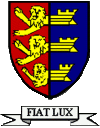by R. C. Colman
In the seventies, education became a major political issue. The government required that each local authority should present plans for comprehensive reorganisation and, in Dover, the three tier system was proposed and accepted by the Department of Education and Science. This meant that the Grammar School was to be demolished to make way for one of the large all-ability upper schools. As a first stage of this. proposed change, new buildings were erected above Leneys. These were to be the temporary home of the top section of Astor Secondary until the day of full comprehension arrived.
The oil crisis of 1973, coupled with the reluctance of the Kent Education Committee to move too fast, delayed comprehensive reorganisation until the change of government at the end of the decade put a stop to these proposals.
It was a difficult ten years, however, because the exciting expansion of the sixties was followed by a ban on all development which was not precisely in line with comprehensive reorganisation. Difficulties and pressures like these, however, produced resolution and the outstanding feature of the seventies was co-operation. The new interest shown in education by the politicians aroused public concern about standards and methods in schools. Parents required to be heard and governors were encouraged and guided to accept their responsibilities with vigour and imagination.
Dover Grammar School was indeed fortunate in its governing body which examined all problems, formed committees, cajoled the local authority, met parents and talked to boys. The parents, too, banded together and raised over £50,000 during the ten years. More important, they became friends with each other and the staff. No single event, be it play or concert or match will suffer from lack of parental support. Many fathers are old boys and the decade saw a splendid revival of the Old Pharosians’ Association. They raised money and talked to the boys about careers but, most significant of all, they came back to visit by ones and twos and for games and for formal dinners.
This coming together provided resources such as the music room, the mezzanine floor, several mini-buses, the swimming pool, curtains, decorations and sports gear. Throughout, the Education Committee has matched our efforts wherever possible. But, beyond these material advantages, co-operation has linked young and old, parents and sons. It has made growing up, self – discipline and responsibility essential elements in the curriculum. It has imposed and required high standards of behaviour both within and outside the school without which knowledge can be dangerous.
We worked together to ensure good scholarship with many boys following distinguished academic careers. Beside this, however, we offered opportunities in music, art, drama, technical studies and games so that each boy could find expression through a commitment in at least one of these areas.
Old Pharosians will testify to our success or otherwise as the years advance. I have been extraordinarily fortunate in the constant support of a dedicated staff who must exemplify the highest hopes of my distinguished predecessors. They have introduced new subjects and offer a remarkable range of opportunities during and after school and in the holidays. There is a challenge for each boy. By accepting that challenge in an atmosphere of good fellowship, he can indeed become a man.
